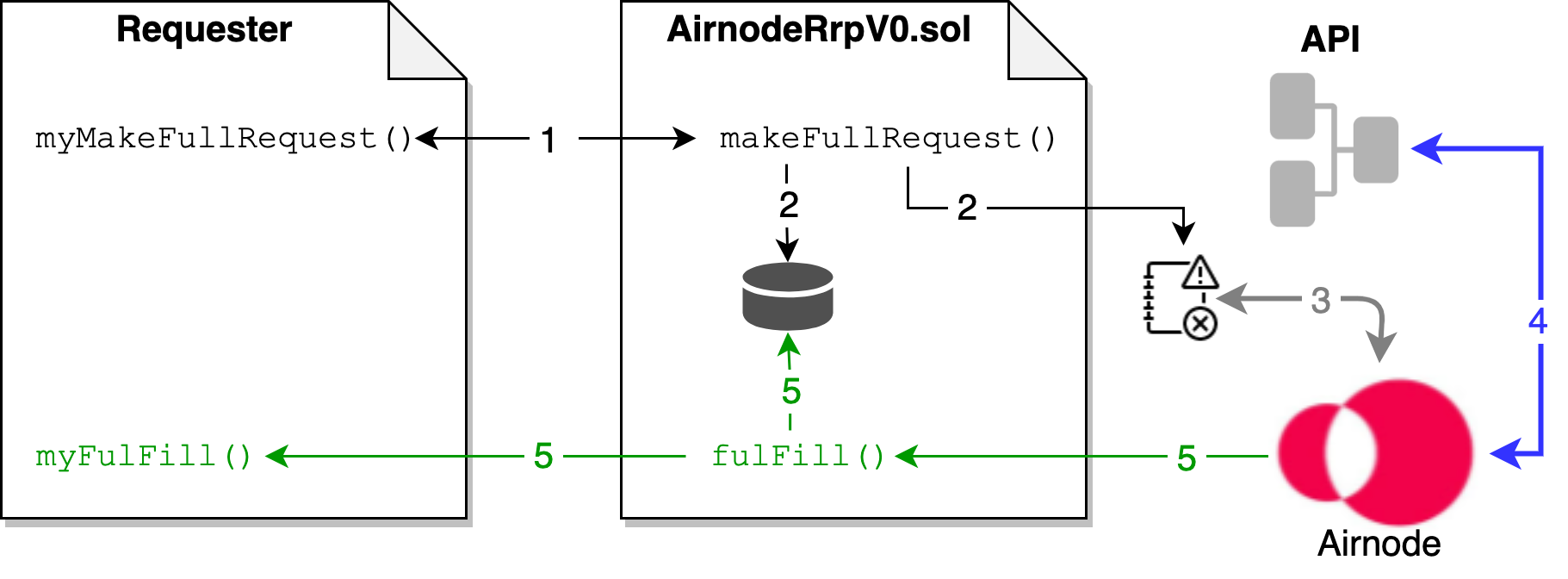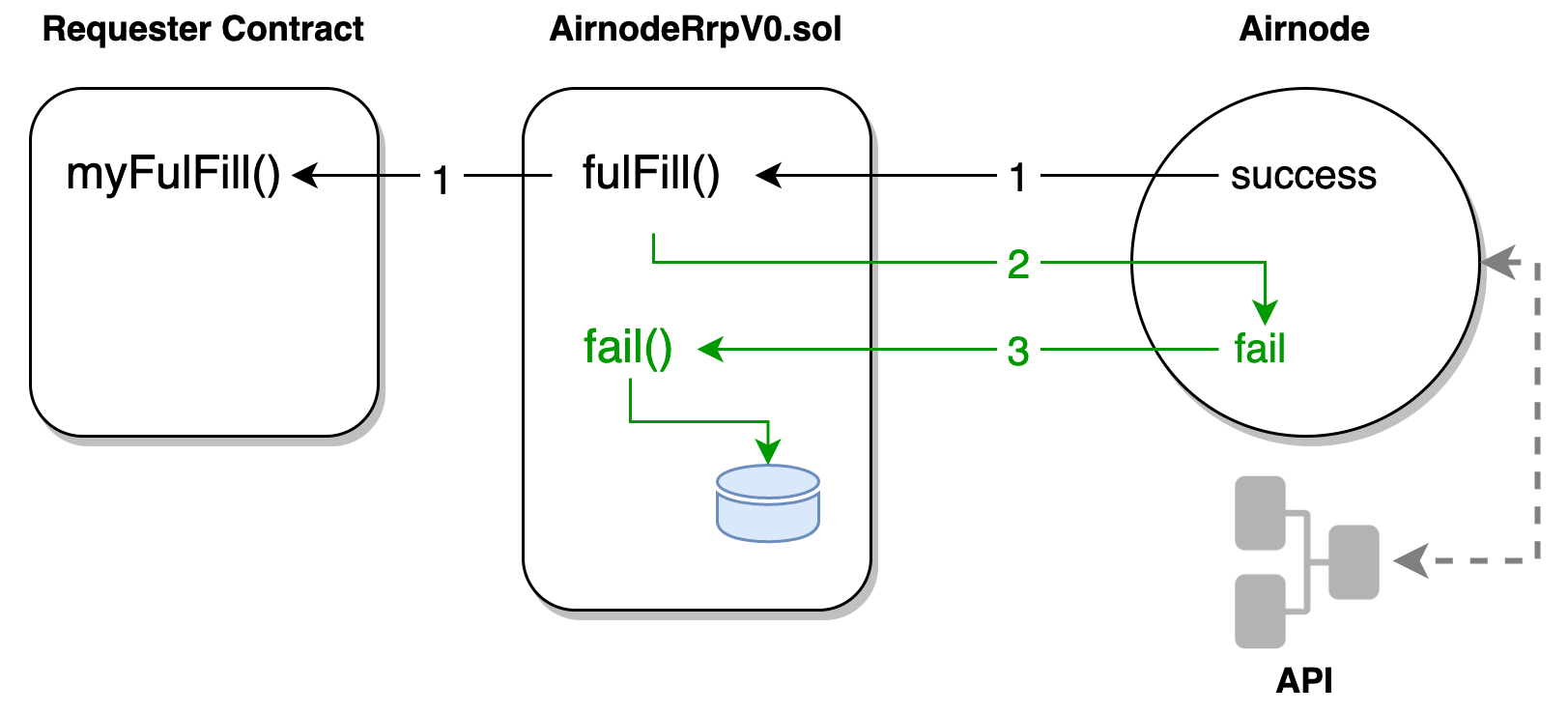# Request
A request is made, by a requester, to either the
makeFullRequest() or makeTemplateRequest() functions of the
AirnodeRrpV0.sol protocol contract which adds the
request to its storage. The targeted off-chain Airnode gathers the
request from AirnodeRrpV0.sol's storage and responds using the fulFill()
function of AirnodeRrpV0.sol.

The requester calls makeFullRequest() on the AirnodeRrpV0 protocol contract.
makeFullRequest() assigns a requestId to the request for tracking purposes, adds the requestId to storage, emits the request to the event logs and returns the requestId to the requester.
Airnode, during its run cycle, picks the request from the event logs.
Airnode gets data from the API and encodes it. The encoded response must have length at most 1024 bytes. (This is negligible in practice, since large responses are costly to store)
Airnode sends the response to fulFill() in AirnodeRrpV0 which in turn removes the pending requestId from storage and forwards the response to myFulFill(). The requestId is included as part of the response.
Learn more on how to Call an Airnode.
# requestId
The requestId uniquely identifies a request. When a requester makes a request
using AirnodeRrpV0.sol, a requestId is generated before the request is added
to the event logs and the requestId is returned to the requester. This
requestId is a hash of certain data members depending on which type of request
is made, makeFullRequest() or makeTemplateRequest(). They only differ in
that one uses endpointId plus airnode address and the other templateId
(since template already contains the airnode address).
| makeFullRequest() | makeTemplateRequest() |
|---|---|
| block.chainid | block.chainid |
| address(this) | address(this) |
| msg.sender | msg.sender |
| requesterRequestCount | requesterRequestCount |
| airnode | |
| endpointId | templateId |
| sponsor | sponsor |
| sponsorWallet | sponsorWallet |
| fulfillAddress | fulfillAddress |
| fulfillFunctionId | fulfillFunctionId |
| parameters | parameters |
After the request (with requestId) is added to the event logs, Airnode gathers
the request and verifies the requestId by re-computing its hash before
responding to the request. This verifies the parameters have not been tampered
with.
# Request Parameters
The following list summarizes the values expected for the parameters of a request.
templateIdthe id of a template to use, (only used formakeTemplateRequest)airnode(address) andendpointIdspecify the endpoint, (only used formakeFullRequest)sponsorandsponsorWallet(addresses) specify which wallet will be used to fulfill the requestfulfillAddressandfulfillFunctionIdspecify which contract/function will be called to fulfill the requestparametersspecify the API and reserved parameters (see Airnode ABI specifications for how these are encoded)
# Full Request
A full request does not refer to a template at all. Full requests are useful if the requester will not make a similar request ever again (e.g., in a prediction market context).
function makeFullRequest(
address airnode,
bytes32 endpointId,
address sponsor,
address sponsorWallet,
address fulfillAddress,
bytes4 fulfillFunctionId,
bytes calldata parameters
){...}
2
3
4
5
6
7
8
9
# Template Request
A template request refers to a template for the airnode address, endpointId
and parameters.
struct Template {
address airnode;
bytes32 endpointId;
bytes parameters;
}
2
3
4
5
The requester can refer to the templateId of a template while making a
request, and the Airnode will fetch these and use them in the request.
function makeTemplateRequest(
bytes32 templateId,
address sponsor,
address sponsorWallet,
address fulfillAddress,
bytes4 fulfillFunctionId,
bytes calldata parameters
)
2
3
4
5
6
7
8
When a template is used to make a request, both the parameters encoded in
parameters of the template and parameters provided at request-time by the
requester will be used by the Airnode. In case the two include a parameter with
the same name, the one provided at request-time will be used.
# Request Outcomes
A request made to an Airnode has three possible outcomes:
# Fulfill
fulfill() is the desired outcome and it will only be called if Airnode
received a successful response from the API provider.

Airnode calls AirnodeRrpV0.fulFill() with a response only if the API has not responded with an error. AirnodeRrpV0.fulfill() performs a call back to myFulFill() which in turn receives the response.
If AirnodeRrpV0.fulFill() fails internally or the underlying low level call to myFulFill() reverts then Airnode will start the process in step #3 to fail the request.
If Airnode errors, or is told by AirnodeRrpV0.fulFill() to error, it calls AirnodeRrpV0.fail() which removes the request from the pending list of requestIds on-chain.
Important to Note
Fulfill is the only outcome that returns results to a requester contract.
For a successful request, Airnode calls the fulfill() function in
AirnodeRrpV0.sol that will in turn call back the requester contract at
fulfillAddress using function fulfillFunctionId to deliver data.
fulfill() also receives a signature to validate on-chain that the response
data was submitted by the Airnode. This is to prevent requesters from fulfilling
their own requests in order to manipulate data submitted by AirnodeRrpV0.sol.
fulfill() will not revert if the fulfillFunctionId external call reverts.
However, it will return false in this case or if there is no function with a
matching signature at fulfillAddress. On the other hand, it will return true
if the external call returns successfully or if there is no contract deployed at
fulfillAddress. In the case false is returned then an error message will
also be returned in a variable which can be decoded to retrieve the revert
string. For example Airnode will decode this variable when this function returns
false and call fail() on AirnodeRrpV0.sol with the revert string as the
error message.
# Fail
As noted in the diagram above, if the transaction that calls fulfill() returns
false, the Airnode decodes the revert string and calls the fail() method to
report the failure. For privacy and security reasons, API error messages are not
sent on-chain. Also note that the node will not attempt to fulfill a failed
request afterwards.
Airnode is stateless, which means that there is no database storing which requests have been fulfilled or failed, which are waiting on confirmations and which are still pending. This information is retrieved from the chain on each request-response cycle (roughly every minute). During each cycle, retrieved requests need to be ordered in the same way to ensure they are submitted using the same nonce. This is important because it's possible for a transaction to not have been confirmed by the time the next cycle runs. If this happens, the transaction is re-submitted with a "faster" transaction fee, overwriting the previous transaction.
# Check if request is awaiting fulfillment
There is a convenience method in AirnodeRrpV0.sol called
requestIsAwaitingFulfillment() that can be called to check if a request was
made but not yet fulfilled/failed. If a requester has made a request, received a
requestId but did not hear back, it can call this method to check if the
Airnode has called back fail() instead.Returns true if the request is
awaiting fulfillment (i.e., true if fulfill() or fail() is not called back
yet), false otherwise.

